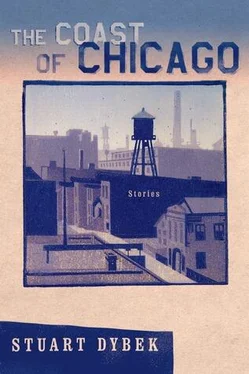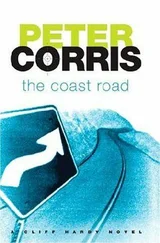“My uncle Carlos would talk to the fish,” Manny said. “No shit. He’d talk to them in Spanish. He didn’t have no choice. Whole time here he couldn’t speak English. Said it made his brain stuck. We used to come fishing here all the time — smelt, perch, everything. I’d come instead of going to school. If they weren’t hitting, he’d start talking to them, singing them songs.”
“Like what?” Eddie said.
“He’d make them up. They were funny, man. It don’t come across in English: ‘Little silver ones fill up my shoes. My heart is lonesome for the fish of the sea.’ It was like very formal how he’d say it. He’d always call this the sea. I’d tell him it’s a lake, but he couldn’t be talked out of it. He was very stubborn — too stubborn to learn English. I ain’t been fishing since he went back to Mexico.”
They walked to the end of the pier, then back past the fishermen. A lot of them were old men gently tugging lines between their fingers, lifting nets as if flying underwater kites, plucking the wriggling silver fish from the netting, the yellow light of their lamps glinting off the bright scales.
“I told you they were out here,” Manny said.
They sat on a concrete ledge, staring at the dark water, which rocked hypnotically below the soles of their dangling feet.
“Feel like diving in?” Manny asked.
Eddie had just raised the bottle to his lips and paused as if actually considering Manny’s question, then shook his head no and took a swallow.
“One time right before my uncle went back to Mexico we came fishing at night for perch,” Manny said. “It was a real hot night, you know? And all these old guys fishing off the pier. No one getting a bite, man, and I started thinking how cool and peaceful it would be to just dive in the water with the fish, and then, like I just did it without even deciding to, clothes and all. Sometimes, man, I still remember that feeling underwater — like I could just keep swimming out, didn’t need air, never had to come up. When I couldn’t hold my breath no more and came up I could hear my uncle calling my name, and then all the old guys on the pier start calling my name to come back. What I really felt like doing was to keep swimming out until I couldn’t hear them, until I couldn’t even see their lanterns, man. I wanted to be way the fuck out alone in the middle of the lake when the sun came up. But then I thought about my uncle standing on the pier calling me, so I turned around.”
They killed the bottle sitting on a concrete ledge and dropped it into the lake. Then they rode the El back. It was getting lighter without a dawn. The El windows were streaked with rain, the Douglas Avenue station smelled wet. It was a dark morning. They should have ended it then. Instead they sat at Manny’s kitchen table drinking instant coffee with canned milk. Eddie kept getting lost in the designs the milk would make, swirls and thunderclouds in his mug of coffee. He was numb and shaky. His jaw ached.
“I’m really crashin’,” he told Manny.
“Here,” Manny said. “Bring us down easier, man.”
“I don’t like doing downers, man,” Eddie said.
“’Ludes,” Manny said, “from Pancho’s stash.”
They sat across the table from each other for a long time — talking, telling their memories and secrets — only Eddie was too numb to remember exactly what they said. Their voices — his own as well as Manny’s — seemed outside , removed from the center of his mind.
At one point Manny looked out at the dark morning and said, “It still seems like last night.”
“That’s right,” Eddie agreed. He wanted to say more but couldn’t express it. He didn’t try. Eddie didn’t believe it was what they said that was important. Manny could be talking Spanish; I could be talking Polish, Eddie thought. It didn’t matter. What meant something was sitting at the table together, wrecked together, still awake watching the rainy light spatter the window, walking out again, to the Prague bakery for bismarcks, past people under dripping umbrellas on their way to church.
“Looks like Sunday,” Manny said.
“Today’s Friday,” Eddie said. “It’s Good Friday.”
“I seen ladies with ashes on their heads waiting for the bus a couple days ago,” Manny told him.
They stood in the doorway of the Prague, out of the rain, eating their bismarcks. Just down from the church, the bakery was a place people crowded into after mass. Its windows displayed colored eggs and little frosted Easter lambs.
“One time on Ash Wednesday I was eating a bismarck and Pancho made a cross on my forehead with the powdered sugar like it was ashes. When I went to church the priest wouldn’t give me real ashes,” Manny said with a grin.
It was one of the few times Eddie had heard Manny mention Pancho. Now that they were outside, Eddie’s head felt clearer than it had in the kitchen.
“I used to try and keep my ashes on until Good Friday,” he told Manny, “but they’d make me wash.”
The church bells were ringing, echoes bouncing off the sidewalks as if deflected by the ceiling of clouds. The neighborhood felt narrower, compressed from above.
“I wonder if it still looks the same in there,” Manny said as they passed the church.
They stepped in and stood in the vestibule. The saints of their childhood stood shrouded in purple. The altar was bare, stripped for Good Friday. Old ladies, ignoring the new liturgy, chanted a litany in Polish.
“Same as ever,” Eddie whispered as they backed out.
The rain had almost let up. They could hear its accumulated weight in the wing-flaps of pigeons.
“Good Friday was Pancho’s favorite holiday, man,” Manny said. “Everybody else always picked Christmas or Thanksgiving or Fourth of July. He hadda be different, man. I remember he used to drag me along visiting churches. You ever do that?”
“Hell, yeah,” Eddie said. “Every Good Friday we’d go on our bikes. You hadda visit seven of them.”
Without agreeing to it they walked from St. Roman’s to St. Michael’s, a little wooden Franciscan church in an Italian neighborhood; and from there to St. Casimir’s, a towering, mournful church with twin copper-green towers. Then, as if following an invisible trail, they walked north up Twenty-second toward St. Anne’s, St. Puis’s, St. Adalbert’s. At first they merely entered and left immediately, as if touching base, but their familiarity with small rituals quickly returned: dipping their fingers in the holy water font by the door, making the automatic sign of the cross as they passed the life-size crucified Christs that hung in the vestibules where old women and school kids clustered to kiss the spikes in the bronze or bloody plaster feet. By St. Anne’s, Manny removed his sunglasses, out of respect, the way one removes a hat. Eddie put them on. His eyes felt hard-boiled. The surge of energy he had felt at the bakery had burned out fast. While Manny genuflected to the altar, Eddie slumped in the back pew pretending to pray, drowsing off behind the dark glasses. It never occurred to Eddie to simply go home. His head ached, he could feel his heart racing, and would suddenly jolt awake wondering where Manny was. Manny would be off — jumpy, frazzled, still popping speed on the sly — exploring the church as if searching for something, standing among lines of parishioners waiting to kiss relics the priest wiped repeatedly clean with a rag of silk. Then Manny would be shaking Eddie awake. “How you holding up, man?”
“I’m cool,” he’d say, and they would be back on the streets heading for another parish under the overcast sky. Clouds, a shade between slate and lilac, smoked over the spires and roofs; lights flashed on in the bars and taquerías . On Eighteenth Street a great blue neon fish leapt in the storefront window of a tiny ostenaria . Eddie tried to note the exact location to add to his window collection. They headed along a wall of viaducts to St. Procopius, where, Manny said, both he and Pancho had been baptized. The viaduct walls had been painted by schoolchildren into a mural that seemed to go for miles.
Читать дальше












